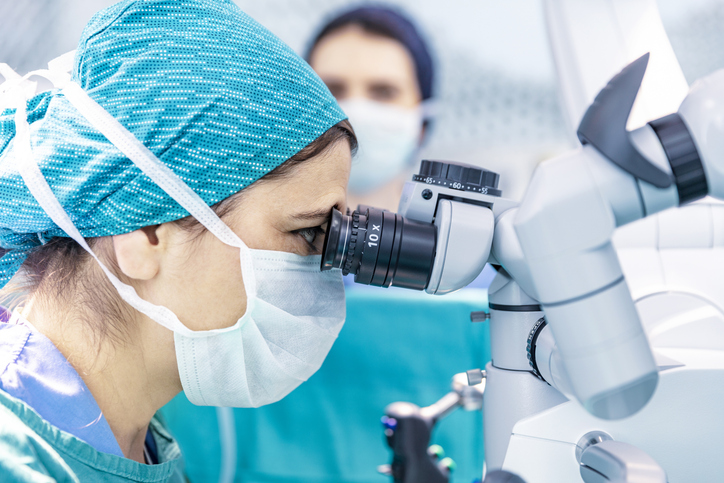Endocrine Surgery
Endocrine Surgery
Endocrine Surgery
Endocrine surgery helps treat conditions like thyroid cancer, Cushing’s syndrome and other gland problems. Endocrine surgeons can remove nodules and tumors. They also remove part or all of certain glands.
At Carilion Clinic, we use the latest minimally invasive surgical techniques whenever possible. These smaller incisions help you recover more quickly.
Endocrine surgery helps treat conditions like thyroid cancer, Cushing’s syndrome and other gland problems. Endocrine surgeons can remove nodules and tumors. They also remove part or all of certain glands.
At Carilion Clinic, we use the latest minimally invasive surgical techniques whenever possible. These smaller incisions help you recover more quickly.
Endocrine surgery is a special field within general surgery. Endocrine surgeons work closely with endocrinologists.
There’s also an overlap between ear, nose and throat (ENT) and endocrine surgeons. At Carilion, these surgical teams work closely together.
Endocrine surgery treats conditions that affect the glands of your endocrine system. These surgeries mostly focus on problems with:
- Thyroid gland: The gland at the front of your neck that regulates your metabolism
- Parathyroid gland: The small glands just behind your thyroid that control the amount of calcium in your blood and bones
- Adrenal glands: The glands on your kidneys that regulate blood pressure, stress responses and reproductive health
- Pancreas: The gland in your abdomen that helps digest food and regulate blood sugar
Types of endocrine surgery
Surgeries to remove a gland all end in -ectomy. For example:
- Thyroidectomy removes the thyroid gland
- Thyroid lobectomy removes one lobe of the thyroid gland
- Parathyroidectomy removes the parathyroid gland
- Adrenalectomy removes one or both adrenal glands
- Pancreatectomy removes all or part of the pancreas
Your endocrine surgeon will talk with you about the surgical technique they’ll be using.
- Laparoscopic surgery is a minimally invasive technique. It only requires small incisions and uses tiny instruments.
- Robotic surgery helps the surgeon be even more precise and have more control. We use robotic and laparoscopic techniques together.
- Open surgery uses a traditional incision to remove a gland or tumor. If your tumor is large or especially complicated, open surgery may be a better option.
When possible, we use minimally invasive surgical techniques.
Do endocrine surgeons perform cancer surgery?
Thyroid cancer is the most common cancer affecting the endocrine system. At Carilion, our endocrine surgeons do treat cancers such as thyroid cancer.
Most thyroid cancers don’t spread to other parts of the body. But your endocrine surgeon may work with an oncologist (a cancer doctor). If your tumor is causing symptoms or behaving aggressively, the surgeon may recommend removing it.
You might need radioactive iodine therapy after thyroid cancer surgery. It’s a type of radiation that targets the thyroid tissues.
What Is Endocrine Surgery?
Endocrine surgery is a special field within general surgery. Endocrine surgeons work closely with endocrinologists.
There’s also an overlap between ear, nose and throat (ENT) and endocrine surgeons. At Carilion, these surgical teams work closely together.
Endocrine surgery treats conditions that affect the glands of your endocrine system. These surgeries mostly focus on problems with:
- Thyroid gland: The gland at the front of your neck that regulates your metabolism
- Parathyroid gland: The small glands just behind your thyroid that control the amount of calcium in your blood and bones
- Adrenal glands: The glands on your kidneys that regulate blood pressure, stress responses and reproductive health
- Pancreas: The gland in your abdomen that helps digest food and regulate blood sugar
Types of endocrine surgery
Surgeries to remove a gland all end in -ectomy. For example:
- Thyroidectomy removes the thyroid gland
- Thyroid lobectomy removes one lobe of the thyroid gland
- Parathyroidectomy removes the parathyroid gland
- Adrenalectomy removes one or both adrenal glands
- Pancreatectomy removes all or part of the pancreas
Your endocrine surgeon will talk with you about the surgical technique they’ll be using.
- Laparoscopic surgery is a minimally invasive technique. It only requires small incisions and uses tiny instruments.
- Robotic surgery helps the surgeon be even more precise and have more control. We use robotic and laparoscopic techniques together.
- Open surgery uses a traditional incision to remove a gland or tumor. If your tumor is large or especially complicated, open surgery may be a better option.
When possible, we use minimally invasive surgical techniques.
Do endocrine surgeons perform cancer surgery?
Thyroid cancer is the most common cancer affecting the endocrine system. At Carilion, our endocrine surgeons do treat cancers such as thyroid cancer.
Most thyroid cancers don’t spread to other parts of the body. But your endocrine surgeon may work with an oncologist (a cancer doctor). If your tumor is causing symptoms or behaving aggressively, the surgeon may recommend removing it.
You might need radioactive iodine therapy after thyroid cancer surgery. It’s a type of radiation that targets the thyroid tissues.
Some of the most common reasons you might need endocrine surgery include:
- You have a lump or growth on a gland
- You have cancer in one of the glands
- A gland has grown too big and is causing problems
- A gland is making too many hormones
Your doctor may try other treatments first. Medication, hormone therapy or nutrition changes can help regulate gland problems.
For example, if you have an overactive thyroid (hyperthyroidism), several medicines can help. For some people, the medicine helps to reduce symptoms. But for others, removing all or part of the thyroid is the best treatment.
Whether you have endocrine surgery usually depends on:
- Your age
- How severe your condition is
- How much the symptoms interfere with your life
- Your risks for other health problems
Who Needs Endocrine Surgery?
Some of the most common reasons you might need endocrine surgery include:
- You have a lump or growth on a gland
- You have cancer in one of the glands
- A gland has grown too big and is causing problems
- A gland is making too many hormones
Your doctor may try other treatments first. Medication, hormone therapy or nutrition changes can help regulate gland problems.
For example, if you have an overactive thyroid (hyperthyroidism), several medicines can help. For some people, the medicine helps to reduce symptoms. But for others, removing all or part of the thyroid is the best treatment.
Whether you have endocrine surgery usually depends on:
- Your age
- How severe your condition is
- How much the symptoms interfere with your life
- Your risks for other health problems
Your care team will talk you through what to expect with endocrine surgery. For example, if your endocrinologist suspects cancer, they’ll likely order a biopsy to check for cancer cells.
At Carilion, we do biopsies at our endocrinology, general surgery and interventional radiology clinics. We use a thin needle and a small syringe to take the cell sample. The doctor will give you numbing medicine, but it may be uncomfortable.
Before endocrine surgery
Before thyroid cancer surgery or other endocrine surgeries, you may need a series of tests.
- Blood tests and urine tests check your hormone levels and gland functions
- Imaging tests help your care team see the location and size of nodules or a tumor
- Vocal cord checks make sure your voice box works as it should
- Heart tests check if adrenal gland problems have affected your heart
During endocrine surgery
You’ll get general anesthesia during surgery, meaning you’ll be fully asleep and won’t feel pain. Your care team may place a tube to help you breathe during the procedure.
- Thyroid or parathyroid surgery should take less than 2 hours
- Adrenal surgery may take 3 hours or longer if done by open surgery
- Other complex procedures, like on the pancreas, can vary widely
When they're done with the surgery, the surgeon will close the incision and take you to the post-anesthesia care unit for close monitoring.
Recovering from endocrine surgery
Some endocrine surgeries are outpatient. This means you go home the same day. However, for surgeries like a total thyroidectomy or adrenalectomy, you’ll probably need to spend 1 - 2 nights in the hospital.
If your surgery was laparoscopic, you’ll probably be able to use over-the-counter medicine to control pain. Open surgery may require more pain management.
After thyroid surgery in particular, it’s common to have a sore throat. Your neck muscles may also feel stiff for a few days. Your doctor will talk to you about when you can return to activities.
If you’re concerned about scarring, talk to your surgeon about our scarless surgery options.
What Should I Expect With Endocrine Surgery?
Your care team will talk you through what to expect with endocrine surgery. For example, if your endocrinologist suspects cancer, they’ll likely order a biopsy to check for cancer cells.
At Carilion, we do biopsies at our endocrinology, general surgery and interventional radiology clinics. We use a thin needle and a small syringe to take the cell sample. The doctor will give you numbing medicine, but it may be uncomfortable.
Before endocrine surgery
Before thyroid cancer surgery or other endocrine surgeries, you may need a series of tests.
- Blood tests and urine tests check your hormone levels and gland functions
- Imaging tests help your care team see the location and size of nodules or a tumor
- Vocal cord checks make sure your voice box works as it should
- Heart tests check if adrenal gland problems have affected your heart
During endocrine surgery
You’ll get general anesthesia during surgery, meaning you’ll be fully asleep and won’t feel pain. Your care team may place a tube to help you breathe during the procedure.
- Thyroid or parathyroid surgery should take less than 2 hours
- Adrenal surgery may take 3 hours or longer if done by open surgery
- Other complex procedures, like on the pancreas, can vary widely
When they're done with the surgery, the surgeon will close the incision and take you to the post-anesthesia care unit for close monitoring.
Recovering from endocrine surgery
Some endocrine surgeries are outpatient. This means you go home the same day. However, for surgeries like a total thyroidectomy or adrenalectomy, you’ll probably need to spend 1 - 2 nights in the hospital.
If your surgery was laparoscopic, you’ll probably be able to use over-the-counter medicine to control pain. Open surgery may require more pain management.
After thyroid surgery in particular, it’s common to have a sore throat. Your neck muscles may also feel stiff for a few days. Your doctor will talk to you about when you can return to activities.
If you’re concerned about scarring, talk to your surgeon about our scarless surgery options.
At Carilion, we treat conditions like thyroid cancer and other endocrine problems every day. We offer the latest treatments and technology close to home.

Comprehensive thyroid care
For thyroid problems, including thyroid cancer, Carilion leads the way in the region. We offer on-site thyroid ultrasound and biopsy.

Minimally invasive surgery options
Our endocrine surgeons know the latest surgical techniques. This includes laparoscopic and robotic surgery, as well as scarless approaches.

Researching new treatments
Our partnership with Virginia Tech Carilion School of Medicine means we’re always researching new ways to treat endocrine problems and improve care. We even conduct research focused on southwestern Virginia.
Why Choose Carilion Clinic?
At Carilion, we treat conditions like thyroid cancer and other endocrine problems every day. We offer the latest treatments and technology close to home.
Health and Wellness

Hyperparathyroidism: What Is It and How Is It Treated?

Lifestyle Medicine: Positive Changes, Powerful Results

Greek-ish Quinoa Salad
Get Care at Carilion Clinic
Treating the people of western Virginia for more than 70 years, we're proud to continue bringing the latest endocrine treatments to our community. We're working to make it easier than ever to connect with us and find the care you need.
Get Care at Carilion Clinic
Treating the people of western Virginia for more than 70 years, we're proud to continue bringing the latest endocrine treatments to our community. We're working to make it easier than ever to connect with us and find the care you need.
Get Care at Carilion Clinic
Treating the people of western Virginia for more than 70 years, we're proud to continue bringing the latest endocrine treatments to our community. We're working to make it easier than ever to connect with us and find the care you need.
Get Care at Carilion Clinic
Treating the people of western Virginia for more than 70 years, we're proud to continue bringing the latest endocrine treatments to our community. We're working to make it easier than ever to connect with us and find the care you need.
